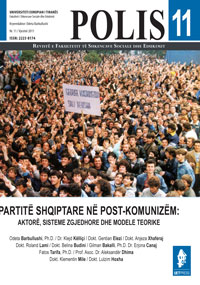Struktura dhe Organizimi i Partisë në Shqipërinë post-komuniste: Një studim mbi Partinë Demokratike të Shqipërisë
Structure and Organization of parties in post-communist Albania: A study of the
Democratic Party of Albania
Author(s): Anjeza XhaferajSubject(s): Politics, Political history, Government/Political systems, Evaluation research, Transformation Period (1990 - 2010)
Published by: Shtëpia botuese “UET Press”
Keywords: Albania; post-communist era; politics; political parties; structure and organization; democratic party of Albania;
Summary/Abstract: This study is an attempt to analyze the factors that have contributed towards the success of the Democratic Party of Albania. It seeks to introduce new dimensions in measuring the success of a political party. The study rejects the elements of ‘office-holding’ and ‘policy – or performance-based’ measures of success, because they are determined by a complex array of economic, political, social and institutional factors. The concept of “party success” is defined in terms of: ‘breadth’ and ‘durability’. At the same time the study aims at ‘emancipating’ the political parties from the past and macro-institutional factors, to which very often are ascribed the reasons for the perceived failure of politics in Albania. The approach used in this study has regarded the political parties as the real political actors that as such should assume the responsibility for the perceived failures. Neither the lack of political culture, nor the communist system, are the main factors to shape the activity and development of political parties in Albania. Both macro-institutional and historical structural approach has limited explanatory power for the success of the Democratic Party. Its success is a direct consequence of the decisions that the political parties themselves, including Democratic Party as one of the key actors, have taken. The research showed that the Democratic Party of Albania has been successful because and when its elite have been able to craft inclusive ideological programs and because of its extensive penetration in the country, which it owes to its structure as a mass party. The party has established patronage linkages with its sympathizers, the rank and file and militants and consequently has ensured their loyalty and maintained an extensive electoral penetration in country.
Journal: Polis
- Issue Year: 2012
- Issue No: 11
- Page Range: 41-59
- Page Count: 19
- Language: Albanian

